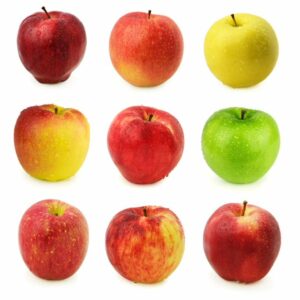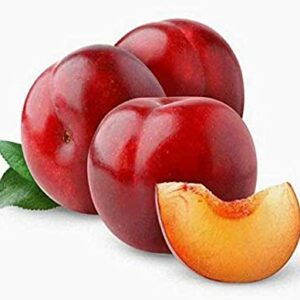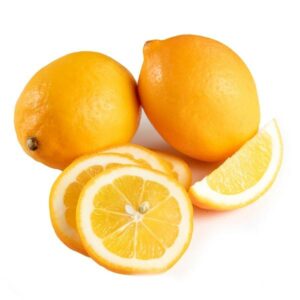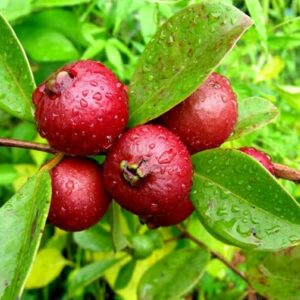Description
The jambolan also known as Zambarau in Kenya is a fast-growing, reaching full size in 40 years. It ranges up to 100 ft (30 m) and a trunk diameter of 2 or 3 ft (0.6-0.9 m). It usually forks into multiple trunks a short distance from the ground. The bark on the lower part of the tree is rough, cracked, flaking and discolored; further up it is smooth and light-gray.
The turpentine-scented evergreen leaves are opposite, 2 to 10 in (5-25 cm) long, 1 to 4 in (2.5-10 cm) wide; oblong-oval or elliptic, blunt or tapering to a point at the apex; pinkish when young; when mature, leathery, glossy, dark-green above, lighter beneath, with conspicuous, yellowish midrib. The fragrant flowers, in 1-to 4-in (2.5-10 cm) clusters, are 1/2 in (1.25 cm) wide, 1 in (2.5 cm) or more in length; have a funnel-shaped calyx and 4 to 5 united petals, white at first, then rose-pink, quickly shed leaving only the numerous stamens.

Climate requirements for zambarau farming
The jambolan tree grows well from sea-level to 6,000 ft (1,800 m) but, above 2,000 ft (600 m) it does not fruit but can be grown for its timber. It develops most luxuriantly in regions of heavy rainfall, as much as 400 in (1,000 cm) annually. It prospers on river banks and has been known to withstand prolonged flooding. Yet it is tolerant of drought after it has made some growth. Dry weather is desirable during the flowering and fruiting periods. It is sensitive to frost when young but mature trees have been undamaged by brief below-freezing temperatures in southern Florida.
Soil requirements for zambarau farming
Despite its ability to thrive in low, wet areas, the tree does well on higher, well-drained land whether it be in loam, marl, sand or oolitic limestone.
Propagation of Zambarau
Jambolan / zambarau seeds lose viability quickly. They are the most common means of dissemination, are sown during the rainy season in India, and germinate in approximately 2 weeks. Semi-hardwood cuttings, treated with growth-promoting hormones have given 20% success and have grown well. Budding onto seedlings of the same species has also been successful. Veneer-grafting of scions from the spring flush has yielded 31% survivors. The modified Forkert method of budding may be more feasible. When a small-fruited, seedless variety in the Philippines was budded onto a seeded stock, the scion produced large fruits, some with seeds and some without. Approach-grafting and inarching are also practiced in India. Air-layers treated with 500 ppm indolebutyric acid have rooted well in the spring (60% of them) but have died in containers in the summer.
The zambarau tree has a wealth of versatility in its use, including food, medicine, and timber. Each part of the tree is used for its astringency, including the fruit, seed, bark, and leaves. The seed has been used in Ayurvedic medicine to support a healthy glycemic response, and modern research has found that the consumption of Jambolan seed supports blood sugar levels within normal ranges and supports healthy liver function. Traditionally, a decoction of the bark was used as a mouthwash. The astringent action is antimicrobial, and helps to tone oral tissues.
A decoction of the bark was also used to support the normal functioning of the gastrointestinal tract. In adults, the bark decoction was directly consumed, and the decoction mixed with goat milk was a common preparation given to children. The Jambolan berry is used in many different ways. It can be eaten raw if the astringency is tolerable, and was a classic convalescent food. The fruits are fragile, and as such jams are a popular preparation. A juice from the fruit can be used in various recipes, such as sherberts, syrups, and tarts. A fruit juice of Jambolan is fermented into wine, brandy, and even vinegar







Reviews
There are no reviews yet.